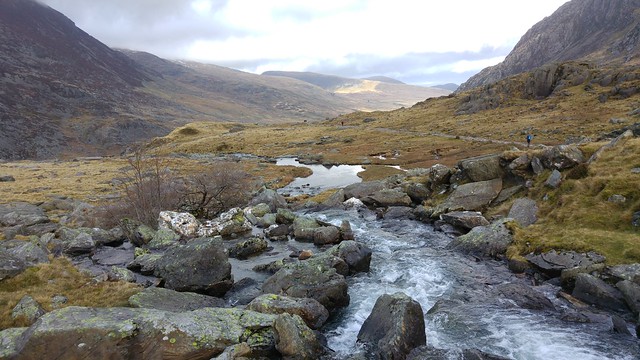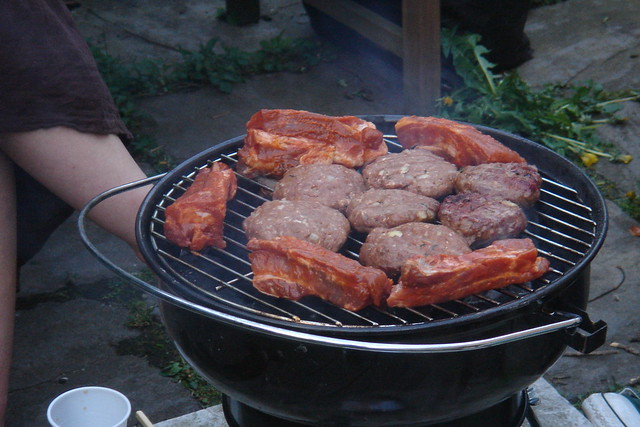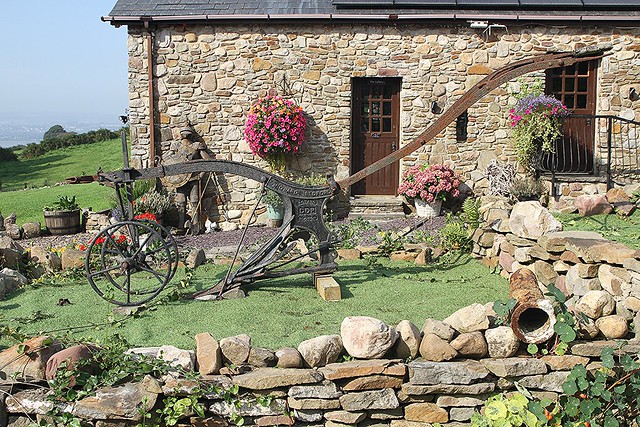Here are some words for valley, glen and related things that are found in some or all of the Celtic languages, and related words in other languages.
Words marked with a * are reconstructions.
| Proto-Celtic | *stratos = valley |
|---|---|
| Old Irish (Goídelc) | srath = grassland, swarth |
| Middle Irish (Gaoidhealg) | srath, sreth, sraith = grass, sward, valley, bottom, meadow or grassy place near a river, fine, tax |
| Irish (Gaeilge) | srath [sˠɾˠa(h)] = river valley, low-lying land along a river srathach = bottom, low-lying, marshy |
| Scottish Gaelic (Gàidhlig) | srath [sdrah] = strath, wide valley, vale srathach = pertaining to or abounding in straths / wide valleys |
| Manx (Gaelg) | strah = level valley, plain, strath, flatness |
| Proto-Brythonic | *strad = valley |
| Middle Welsh (Kymraec) | ystrad, istrad, ystrat = (floor of a) valley, vale, plain |
| Welsh (Cymraeg) | ystrad [ˈəsdrad] = (floor of a) valley, vale, plain |
| Old Cornish | stræt = flat valley, low lying land, lowland |
| Middle Cornish (Cernewec | strat = flat valley, low lying land, lowland |
| Cornish (Kernewek) | stras = flat valley, low lying land, lowland |
| Old Breton (Brethonoc) | strat = bottom, low ground |
| Middle Breton (Brezonec) | strat = bottom, low ground |
| Breton (Brezhoneg) | stad [strɑːt] = bottom, low ground |
Etymology: the Proto-Indo-European *str̥h₃tós (stretched, spread), from *sterh₃- (to spread, extend, stretch out [Source]. Words from the same roots include sternum, strategy, stratus, stray, street (a type of cloud) and stratosphere in English, estrato (layer, stratum, stratus [cloud]) in Spanish, and sarnu (to trample, tread, ruin) in Welsh [Source].
| Proto-Celtic | *kumbā = valley |
|---|---|
| Transalpine Gaulish | *cumba = valley |
| Gaulish | *kumba = valley |
| Irish (Gaeilge) | com [kʌmˠ] = coomb, cirque, mountain recess |
| Proto-Brythonic | *komm = valley |
| Middle Welsh (Kymraec) | cum, cwm(m), kwm = a deep narrow valley, dale, dingle kwm(m)an = hump, stoop, hunchback, rump kwmarch, cwmaearch = ravine, dingle, little valley |
| Welsh (Cymraeg) | cwm [ˈəsdrad] = a deep narrow valley, coom, glen, dale; hollow, bowl-shaped depression cwmach = a stoop cwman = hump, stoop, hunchback, rump cwmanu = to stoop, hunch cwmanllyd, cwmanog = hunchbacked, crooked, bent cwmarch = ravine, dingle |
| Middle Cornish (Cernewec | cum = a valley opening downwards, from a narrow point, a dingle |
| Cornish (Kernewek) | komm = cirque, corrie, cwm |
| Middle Breton (Brezonec) | comm = combe, small valley, (water) trough, river-bed |
| Breton (Brezhoneg) | komm [ˈkɔ̃mː] = combe, small valley, (water) trough, river-bed komman, kommañ = to form hollows kommek = forming hollows |
Etymology: from the Proto-Indo-European *kumbʰos / *kumbʰéh₂, either from PIE *kew- (bend) or a from non-Indo-European substrate [Source].
Words from the same roots include cwm, combe (a valley or hollow, often wooded and with no river; a cirque) in English, combe (combe) in French, and coma (combe, cwm, cirque; an alpine meadow situated between two peaks) in Catalan [Source].
A dingle is a small, narrow or enclosed, usually wooded valley [Source].
| Proto-Celtic | *glendos = valley |
|---|---|
| Old Irish (Goídelc) | glenn [ɡʲlʲen͈] = valley |
| Middle Irish (Gaoidhealg) | glenn = valley, hollow, depression glennach = having vales or hollows, curly (hair) |
| Irish (Gaeilge) | gleann [ɟlʲɑun̪ˠ(h) / ɟlʲɑːn̪ˠ / ɟlʲan̪ˠ] = glen, hollow gleann = abounding in glens, hollow-backed, wavy (hair) gleanntán = small glen, dell, dale gleanntóir = glensman, dalesman |
| Scottish Gaelic (Gàidhlig) | gleann [glaun̪ˠ] = glen, valley gleannach [glan̪ˠəx] = having or related to glens, steep sided gleannan [glan̪ˠan] = small glen / valley gleann crochte = hanging valley gleann sgoraidh = rift valley |
| Manx (Gaelg) | glion(e) [ɡlʲɔᵈn] = valley, glen, vale, creek |
| Proto-Brythonic | *glɨnn [ɡlɨnː] = glen, dale, valley |
| Middle Welsh (Kymraec) | glynn, glyn = glen, dingle, dale, dell (wooded) valley |
| Welsh (Cymraeg) | glyn [ɡlɨ̞n / ɡlɪn] = glen, dingle, dale, dell (wooded) valley, gloom, distressing experience |
| Middle Cornish (Cernewec | glen, glyn = valley (through which a river flows), a woody valley, dale |
| Cornish (Kernewek) | glynn, glydn = deep wooded valley, glen |
| Middle Breton (Brezonec) | glenn, glen = earth, country |
| Breton (Brezhoneg) | glen = bottom, low ground |
Etymology: the Proto-Indo-European *glendos (shore). Words from the same root include klit (dune) in Danish, klettur (rock, crag, cliff) in Icelandic, and cleit (rocky outcrop, cliff, reef) in Scottish Gaelic [Source].
The Irish word ailt refers to a steep-sided glen, ravine, height or cliff. There are cognate words in other Celtic languages, such as allt (hill, slope, cliff) in Welsh [More details].
| Proto-Celtic | *nantos / nantus = stream, valley |
|---|---|
| Gaulish | nanto, nantu = valley |
| Proto-Brythonic | *nant [nant] = stream, river, valley |
| Middle Welsh (Kymraec) | nant = river, stream, brook |
| Welsh (Cymraeg) | nant [nant] = river, stream, brook, rivulet; torrent, ditch, valley, glen, dale; ravine, gorge nentig, nennig = small stream |
| Middle Cornish (Cernewec | nans = valley, dale, ravine |
| Cornish (Kernewek) | nans [nans / nænz] = dale, vale, valley krognans = hanging valley |
| Old Breton (Brethonoc) | nant = valley with watercourses |
| Middle Breton (Brezonec) | nant, ant = valley with watercourses |
| Breton (Brezhoneg) | nant [nãnt] = valley with watercourses (found in place names – archaic) |
Etymology: possibly from Proto-Celtic *nemetom (sacred place, sanctuary), from the Proto-Indo-European *nem- (to give, take, distribute) [source].
The Francoprovençal word nant (stream) comes from the same Proto-Celtic roots [source], as does the French place name Nanterre [source], the Irish word neimheadh (sanctuary, privilege of rank, holy thing), and the Breton word neved / neñved (sanctuary) [source].
More details of words for Streams and Currents in Celtic languages.
| Old Welsh (Kembraec) | t(o)nou = valley, vale, hollow, dale |
|---|---|
| Middle Welsh (Kymraec) | tnou, tonou, tyno, tino = valley, vale, hollow, dale |
| Welsh (Cymraeg) | tyno = valley, vale, hollow, dale, plain, green |
| Cornish (Kernewek) | tnow = dale, valley-bottom |
| Old Breton (Brethonoc) | tenou, tnou = bottom, lower part, valley |
| Middle Breton (Brezonec) | tnou [trãw] = bottom, lower part, valley trauyen = valley |
| Breton (Brezhoneg) | traoñ, traou [trãw] = bottom, lower part, valley (found in place names) traoñienn [ˈtrãw.jɛn] = valley |
Etymology: unknown [Source].
Another Welsh word for valley is dyffryn [ˈdəfrɨ̞n / ˈdəfrɪn], which comes from dwfr (water) and hynt (course, way). There are no cognates in other Celtic languages, as far as I can discover [Source].
Sources: Wiktionary, Am Faclair Beag, Online Manx Dictionary, Teanglann.ie, eDIL – Electronic Dictionary of the Irish Language, In Dúil Bélrai English – Old Irish glossary, Geiriadur Prifysgol Cymru, Gerlyver Kernewek, Dictionaire Favereau, TermOfis, English – ProtoCeltic WordList (PDF), Etymological Dictionary Of Proto Celtic














